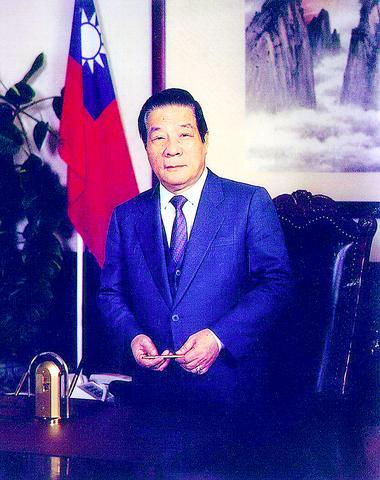Tsai Wan-lin (
Despite his family background, Tsai rose out of destitution to became one of the nation's legends -- one of those who have developed massive enterprises from scratch.

TAIPEI TIMES FILE PHOTO
At the age of eight, Tsai followed his elder brother, Tsai Wan-chun (
His business career started to take off after he established the Cathay Life Insurance Corp (
Cathay Life later become the flagship of Cathay Financial Holdings Co (國泰金控) and the group's main earnings contributor. At the end of June, Cathay Life accounted for 62 percent of Cathay Financial's consolidated assets of NT$2.5 trillion and 58 percent of the financial service company's capital of NT$146.7 billion, according to Taiwan Ratings Corp's (中華信評) statistics.
The family's financial group split in 1979 and in 1985, Tsai Wan-lin formed the Lin Yuan Group (
The group later evolved to include Symphox Information Co (
Earlier this year, Tsai and his family were estimated to hold assets worth US$4.6 billion, ranking 94th richest in the world, according to a Forbes report published in February. The nation's richest man had ranked 88th, 68th and 104th in the magazine's list in the previous three years.
Tsai Wan-lin moved to keep the business in the family. When he was 66, he began to make arrangements for his succession, putting his four sons in the business.
Currently, his second son, Tsai Hong-tu (
His third son, Tsai Cheng-yu (
Tsai's success in amassing a fortune out of nothing came from his bold yet precise investments in real estate. Cathay Life owns 230 buildings nationwide, with many located in prosperous downtown areas such as Taipei Main Station. These buildings contribute billions of NT dollars in rent every year, according to local media reports.
Tsai Wan-lin's younger brother, meanwhile, Tsai Wan-tsai (蔡萬才), is the fifth richest man in the nation, ranking 231 on the Forbes list this year, with US$2.3 billion in assets. Tsai Wan-tsai heads Fubon Financial Holding Co (富邦金控), the fifth-biggest financial services company with NT$1.26 trillion in assets last year.
Relations between the brothers had been strained for most of last 20 years, however, due to a financial scandal involving their nephew, Tsai Chern-chou (
In 1985, Tsai Chern-chou became embroiled in a controversy after embezzling over NT$7.8 billion from the 10th Credit Cooperative of Taipei (
On the business front, the brothers were rivals as well. The Cathay and Fubon groups have competed for dominance in the financial market.

Sweeping policy changes under US Secretary of Health and Human Services Robert F. Kennedy Jr are having a chilling effect on vaccine makers as anti-vaccine rhetoric has turned into concrete changes in inoculation schedules and recommendations, investors and executives said. The administration of US President Donald Trump has in the past year upended vaccine recommendations, with the country last month ending its longstanding guidance that all children receive inoculations against flu, hepatitis A and other diseases. The unprecedented changes have led to diminished vaccine usage, hurt the investment case for some biotechs, and created a drag that would likely dent revenues and

Global semiconductor stocks advanced yesterday, as comments by Nvidia Corp chief executive officer Jensen Huang (黃仁勳) at Davos, Switzerland, helped reinforce investor enthusiasm for artificial intelligence (AI). Samsung Electronics Co gained as much as 5 percent to an all-time high, helping drive South Korea’s benchmark KOSPI above 5,000 for the first time. That came after the Philadelphia Semiconductor Index rose more than 3 percent to a fresh record on Wednesday, with a boost from Nvidia. The gains came amid broad risk-on trade after US President Donald Trump withdrew his threat of tariffs on some European nations over backing for Greenland. Huang further

CULPRITS: Factors that affected the slip included falling global crude oil prices, wait-and-see consumer attitudes due to US tariffs and a different Lunar New Year holiday schedule Taiwan’s retail sales ended a nine-year growth streak last year, slipping 0.2 percent from a year earlier as uncertainty over US tariff policies affected demand for durable goods, data released on Friday by the Ministry of Economic Affairs showed. Last year’s retail sales totaled NT$4.84 trillion (US$153.27 billion), down about NT$9.5 billion, or 0.2 percent, from 2024. Despite the decline, the figure was still the second-highest annual sales total on record. Ministry statistics department deputy head Chen Yu-fang (陳玉芳) said sales of cars, motorcycles and related products, which accounted for 17.4 percent of total retail rales last year, fell NT$68.1 billion, or

MediaTek Inc (聯發科) shares yesterday notched their best two-day rally on record, as investors flock to the Taiwanese chip designer on excitement over its tie-up with Google. The Taipei-listed stock jumped 8.59 percent, capping a two-session surge of 19 percent and closing at a fresh all-time high of NT$1,770. That extended a two-month rally on growing awareness of MediaTek’s work on Google’s tensor processing units (TPUs), which are chips used in artificial intelligence (AI) applications. It also highlights how fund managers faced with single-stock limits on their holding of market titan Taiwan Semiconductor Manufacturing Co (TSMC, 台積電) are diversifying into other AI-related firms.